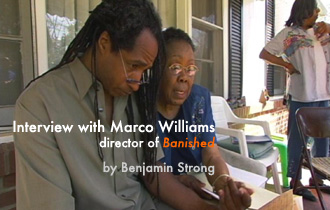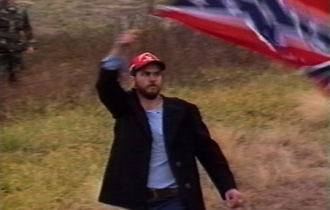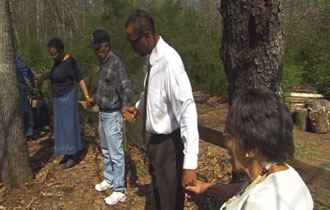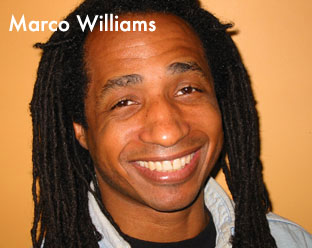Interview with director Marco Williams
24.09.07
 From compact one-room churches and town halls to high school football games and leafy sidewalks bereft of pedestrians, the most unsettling aspect of Banished, a new documentary by Marco Williams, is the utter familiarity and timelessness of its all-American backdrop. For while our nation turns its lonely eyes to the picket fences of Desperate Housewives (and Weeds, and whatever other recycled iterations of 1950s middle-class ennui folks are currently gawking at), Williams has excavated from our suburbs a crime far more insidious than marital infidelity. That his tale hinges on dusty municipal plat maps and lost deeds makes it no less stirring.
From compact one-room churches and town halls to high school football games and leafy sidewalks bereft of pedestrians, the most unsettling aspect of Banished, a new documentary by Marco Williams, is the utter familiarity and timelessness of its all-American backdrop. For while our nation turns its lonely eyes to the picket fences of Desperate Housewives (and Weeds, and whatever other recycled iterations of 1950s middle-class ennui folks are currently gawking at), Williams has excavated from our suburbs a crime far more insidious than marital infidelity. That his tale hinges on dusty municipal plat maps and lost deeds makes it no less stirring.
Banished, which opens a two-week run at New York’s Film Forum, is about the ethnic cleansing of blacks from white communities between the end of the Civil War and the early days of the Depression. Williams focuses on three communities in particular—Forsyth County, Georgia, Pierce City, Missouri, and Harrison, Arkansas—where through a series of lynchings, hangings, and murders, African-Americans were systematically chased from their homes, leaving behind property that was then fraudulently acquired by white neighbors.
By following the descendants of those who were expelled from these communities in their efforts to seek restitution, Williams demonstrates that the legacy of these atrocities is palpable in modern America, even as it remains unacknowledged. For example, there are fewer than forty African-American residents today in Boone County, where Harrison is seated. The county has a total population of 34,000. Harrison is also host to the headquarters of the largest contemporary sect of the Ku Klux Klan, whose leader, Thom Robb, grants Williams an interview.
Shot in varying grades of video, with Williams as narrator, Banished derives a quiet power from just how deceptively banal its scenery looks. Yet the seasoned cinephile will notice the long takes, and the camera’s attention to details at the edge of the frame. Williams has made a documentary with an unforced naturalism that’s every bit as credible as the best frame in a Jean Renoir movie.
Last week Fanzine sat down with Williams in his office at New York University, where he teaches documentary film production, to talk about how this history of ethnic cleansing in America has been so easily suppressed.
FANZINE: Early in Banished, James Brown, a descendant of those who were expelled from Pierce City, MO, explains how he came to discover what had happened in that town, how he met someone at a professional conference who happened to be from there and when she learned that his relatives had once lived there immediately said, “I’m so sorry.” He said he didn’t know at the time what she meant. His surprise seems to stand in for the way that many people react elsewhere in the film when they learn about this history. Was there any element of surprise for you in this project?
MARCO WILLIAMS: You know I want to say there was an element of surprise and even shock and yet—I don’t want this to sound callous—but once I learned some of the details of what had happened…
There have been so many atrocities committed against African-Americans over the centuries that you almost become inured to the shock value. I made a film called Two Towns of Jasper about James Byrd. Black man dragged behind a pick-up truck. The most horrific, heinous, racially-motivated crime. And yet some part of me was like, business as usual.
I do think where I join the legions of people who have seen Banished and reflected on it is that I too was ultimately unaware of the particularity of this history of forced expulsions of African-Americans, resulting in communities being white or virtually all white today. The effective perpetuating of an American ethnic cleansing, that’s where I’m stunned that we don’t know about this.
 FANZINE: And yet, although the material is largely historical, the story you tell takes place mostly in the present day. Was making the movie about the present rather than the past something you wanted to do from the start?
FANZINE: And yet, although the material is largely historical, the story you tell takes place mostly in the present day. Was making the movie about the present rather than the past something you wanted to do from the start?
MARCO WILLIAMS: The stories [about ethnic cleansing] of a hundred years ago are persuasive, engaging, dramatic even, heroic. And yet I didn’t want to create a film that was exclusively archival and interview based. Even as in Pierce City—by way of detour—one of the widows of the three black men who were hanged went to court to try to recover the land of her husband. It foreshadowed what I was trying to show in the present, but there was really no archive of that. The court records were…What was I going to do? Have Morgan Freeman or somebody read …The way I thought I could be interested and therefore tell a story was to make the past relevant to today.
First and foremost was the question, can I find any descendants? If you’ve got a descendant, black or white, then you’ve got a thread all the way back. And the first thread that I found was James Brown. He and his brother Charles wanted to have the town [Pierce City, MO] disinter their great-grandfather’s remains. And my antennae went like, perfect. Because now you have someone taking action that reverberates and connects the past to the present as well as to the future. I was off to the races. That was my first story. What was important was the value of having African-Americans re-engaging this history. So not a story initially triggered by white consciousness or white guilt, which is what Harrison, AK, is about, but about African-Americans making a request or taking an action that demanded that blacks and whites confront the past.
FANZINE: You spoke of white consciousness raising. While you were making the film did you witness any consciousness raising among African-Americans, or was it strictly a discovery of what you called the particularity of this history?
MARCO WILLIAMS: Both black and white discover something. I would say that Charles Brown doesn’t necessarily discover anything. African-American is a composite character if you will—some part Stricklands [a family who retain a small cemetery plot on stolen land in Forsyth County], some part Browns, some part African-American women, some part Marco Williams, who is a character in the film and also African-American. We experience a consciousness through the Stricklands. Their land has been stolen, and they have a legitimate question. How did this happen and what can we do about it? But they aren’t of the mind that you must give it back, and I demand it back, and give it to me.
 FANZINE: That brings us to the question of reparations. The response of Pierce City’s mayor to James Brown’s request to pay for the disinterment and reburial of his great-grandfather is priceless. He says, “You’re asking money to do what money can’t do.” You yourself make an even less modest proposal when you interview the mayor on camera. You actually suggest returning all of the stolen land to the descendants. Do you believe that returning that stolen land is the only appropriate form of reparation?
FANZINE: That brings us to the question of reparations. The response of Pierce City’s mayor to James Brown’s request to pay for the disinterment and reburial of his great-grandfather is priceless. He says, “You’re asking money to do what money can’t do.” You yourself make an even less modest proposal when you interview the mayor on camera. You actually suggest returning all of the stolen land to the descendants. Do you believe that returning that stolen land is the only appropriate form of reparation?
MW: My views and thoughts evolve, right? Here’s a through-line. When I first started to make this film I was interested in what I called the R word. Reparations. And then the R word had tentacles or branches and then it was restitution. Because if something is stolen then one of the things the law provides for is compensation. It was then also redress, which was something else. As I did this, I started to understand that reparations wasn’t necessarily a check, wasn’t necessarily monetary. Then there’s reconciliation. How do you reconcile these events? And some part of that is repair. Hence for [a white citizen] in the film to say, well maybe you should put a monument up as a remedy. Or take a Confederate flag down. Teach it in the schools. Ultimately the place where I intervene is Pierce City. Maybe it seems flippant because the Mayor’s response is flippant, but it’s a very cogent consideration on my part.
Here’s the solution I arrived at—I don’t know if this can work—but yes, it is about the land. I wanted to look at reparations in a way that was concrete for Americans to think about. Whenever reparations are associated with African-Americans they are associated with slavery, and that seems too nebulous. You know, one drop of black blood, you probably have some of it, and all of our ancestors were slaves, that kind of thing. But Banished looks at something tangible and concrete and understandable to Americans. As the film reveals land was stolen. Of course these blacks lived there, homesteaded, they had property, they owned things. So the short answer is I do think in the case of the banishment, these American ethnic cleansings, the most direct way, the most substantial way, to provide repair and a reconciliation is the return of land.
Harrison, AK, has a group of white citizens who believe they are doing good by forming a task force on race relations. They believe that they are doing good by contributing to the education of two young African-American women at their junior college [who were given scholarships in the name of a woman buried in the local cemetery without even a headstone]. And they should be commended for actions and gestures of good will. And yet it’s a community where the Klan has its headquarters, where white racists come to retire because it’s all white and because it’s a community where the Confederate flag flies outside of the chamber of commerce. If you do not have blacks living in these all white communities, you are going to have the Klan, you are going to have racist whites, you are going to have the Confederate flag. So if land is returned, now blacks live there, and now the Confederate flag is not going to be there, white racists aren’t going to be there. The community begins to change.
 FANZINE: And by giving them this property—which is now considerably more valuable than it once was, particularly in Forsyth County—that’s a way of creating the black middle class that’s the missing equation in these communities and in much of the rest of America.
FANZINE: And by giving them this property—which is now considerably more valuable than it once was, particularly in Forsyth County—that’s a way of creating the black middle class that’s the missing equation in these communities and in much of the rest of America.
MW: In the film Sherrilyn Ifill, a law professor at the University of Maryland, communicates that part of the consequence of these expulsions is, I believe she says, the necessity to start over again. What we understand about wealth and class in this country is that for many whites wealth was passed down from generation to generation, which allows you to establish and fortify certain values. And a lot of that wealth is embodied by land. And so if African-Americans in the early part of the twentieth century owned land and were kicked off that land, that meant that they had to start over again.
If I were to do this film again, I would have focused even more exclusively on land. I would probably have a different film and been much more of an investigative journalist and really been the agitator. But I was satisfied at the time that there was just enough to suggest and allow for the intelligent viewer to get it, and then to hopefully ask certain questions.
FANZINE: Sherrilyn Ifill uses the word “magnanimous” to describe the motivation of the Harrison church behind the scholarships given to the two African-American girls, that it allows whites to feel good about themselves without actually addressing the problem. But you also make the point in the film that these all-white communities have a culture today that is rooted in the history of these expulsions. In order for these communities to change, in other words, they must literally change their culture. Are gestures like the scholarships really superficial, or are they necessary to build the momentum that will bring the change?
MW: This question confounded me, because on the one hand I think anybody who makes a gesture should be acknowledged for their gesture. Anybody who takes a step towards some change should not be slapped around for not doing more. Harrison did more than Pierce City did. They did more than Forsyth County did. And yet I really did come to feel that their understanding of this situation was limited.
In a certain way, and this is almost being insensitive to them, they didn’t have a clue that their concern was their self-image, how they looked. Ultimately, they didn’t seem to be concerned with real concrete change. Which is why I included in that part of the film David Zimmerman [a Harrison resident], who expresses to them, well, you could put a monument up. The irony is that you go to any—let’s say we’re talking about the South—there are monuments upon monuments upon monuments to the Confederacy. There are Confederate soldier monuments in almost every small town. So the prospect of acknowledgment is part of the culture of these communities.
There’s a scene that I never got into the film. It takes place in Harrison. It involves me wandering through the high school. The narration would have been effectively, you know, I went to the school for some evidence or some suggestion of history. Then, I stopped and I asked the superintendent of schools, is the history of Harrison taught in the school? And he says, “I don’t know.” Now the parenthetical is, this is scary. The superintendent, who oversees curriculum, has no idea whether this is taught in school. When I ask him does he think it should be, he says, well, maybe—“it was a black time.” And so he sort of fumbles over the double entendre. This very community that’s so concerned with scholarships for the girls, they don’t want to make any public acknowledgment that this happened.
 FANZINE: One of the things I wrote in my notes when I saw Banished was “Fuck Borat.” Have you seen that film?
FANZINE: One of the things I wrote in my notes when I saw Banished was “Fuck Borat.” Have you seen that film?
MW: No.
FANZINE: What I meant was that Sacha Baron Cohen uses provocateur tactics in that film to extricate the racism that is supposedly beneath the surface of American culture, which quite obviously it is. And yet, Borat’s method felt false, and it didn’t treat either side fairly. There was way too much caricature. One of the most impressive things about your film was that everyone was given a sense of humanity, right down to Klan leader Thom Robb. No one was caricatured. Was this something you consciously set out to do, to give a fair and balanced (not in the Fox News sense) viewpoint?
MW: Yes. I think there are those who know me who might say, Marco, you’re a confrontational person and yet there’s no overt, over-the-top confrontation in Banished coming from me, who is really the agitator throughout. And I did consciously choose to question, to probe, to reflect, but ultimately not to judge.
I can promise you that as easy a target as Thom Robb is in the film or as Phil Bettis is in the Forsyth story [an attorney who argues that the titles to the stolen land now held by whites are legal under Georgia law], Charles Brown for many people is perceived as not being ethical or honest and trustworthy. I was consciously allowing everyone to be the selves that they presented to me. Personally, I share some of Charles’s views and demands. Would that have been my tactic, to not have mentioned a wish for reimbursement [from Pierce City, until after the work had been done], who knows? But I agreed with the demand.
I have taken here and there some subtle and not so subtle criticism for not being more confrontational. I even wonder if in some places the film has not been screened or accepted because it’s a little too gentle. But I don’t think it would have been fair. It’s so important to have Bob Scott [a retiree in Harrison] say I came here because of the cost of land or houses and the absence of blacks—with a black person sitting across from him, and not saying, what are you talking about you racist pig. Because we get it, right? We get it. And I feel comfortable with those choices, because that’s the kind of film I want to make.